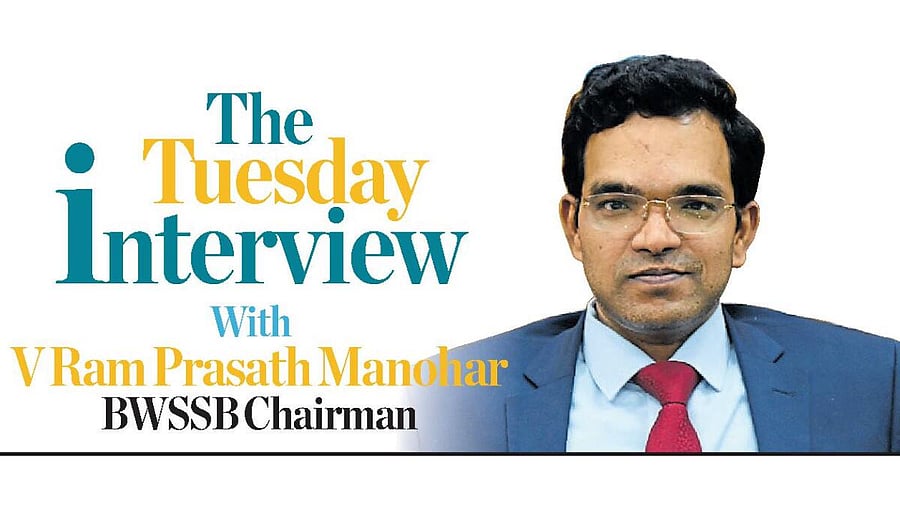
The Tuesday Interview
As summer heats up, Bengalureans are haunted by memories of last year’s acute water crisis. However, the Bangalore Water Supply and Sewerage Board (BWSSB), the city’s primary water provider, claims that Bengaluru is now water-surplus, having developed the capacity to distribute water to all its citizens. In an interview with DH’s Nina C George, BWSSB Chairman
V Ram Prasath Manohar explains that the challenge now lies in weaning people off groundwater in certain areas and encouraging everyone to apply for a Cauvery water connection to reap the benefits of water security.
Excerpts:
The state budget has just been announced. Has BWSSB prioritised work and decided the allocations?
The cabinet has approved Rs 1,000 crore for building nine sewage treatment plants (STPs) with a total capacity of 148 MLD and 400 km of sewer line. Wherever there is a gap in the 110 villages, we are planning to build the new STPs. The budget has allocated Rs 1,000 crore, but this will be in the form of a guarantee for the World Bank loan.
You had said last year that you would make Bengaluru water-surplus. Has this been achieved?
We have achieved our vision of making Bengaluru water-surplus. We have built a capacity to supply 2,275 MLD of water. Earlier it was 1,540 MLD. We have a sufficient quantity of water and built-in capacity now. The only problem is distribution. For this, people must come forward and take piped water connections. But some areas rely on groundwater, which can pose health risks due to the presence of heavy metals. We recommend switching to Cauvery water connections, which offer better quality water. Furthermore, there is a proposal underway to make Cauvery connections mandatory for apartments.
It has been a few months since Cauvery Stage 5 was launched. What is the progress on meeting the targeted connections? Complaints about not getting connections persist...
Before the commissioning of Cauvery Stage 5, there were 63,000-odd connections, and now we have 86,900 connections. We are addressing complaints about certain areas not getting water. This is because the Cauvery water line distributor network was laid in 2018, and during the last six years, agencies like GAIL and BESCOM have, unintentionally, damaged our network. After releasing the water into these lines and locating the leakages, we are fixing them. About 104 out of the existing 110 villages have been given water. Land litigations are also causing delays in giving connections.
There have been allegations that pro-rata charges for apartments and independent houses are different, and people have had to pay more. How will you address this?
Pro-rata charges were revised in 2020 and remain the same. We are planning to introduce an EMI option to deal with complaints about huge deposits being charged for Cauvery connections. Here, people will have to initially pay a token amount and pay the rest later in instalments. As regards apartment owners, they say that they have paid charges to the builders, who have not paid to the BWSSB. There is some misunderstanding between apartment owners and builders. We are in the process of solving that. We have asked the apartment owners to give us a complaint that they have paid the pro-rata charges to the builders and they have not paid to BWSSB. We will address this legally.
How do you plan to introduce greater fairness and transparency in charging for Cauvery water connections, for both individual homes and apartments?
We are introducing a model calculator on our website. Here, the pro-rata charges will be calculated based on the data, such as area and other details, uploaded by citizens. Consumers will have to bear the cost of the additional length of pipeline needed to be laid from the BWSSB network to the consumer point. We will provide a standard estimate for this and the details of all our 2,000-odd registered plumbers will be on our website, and people can call any of them to get the job done. All complaints against contractors and any other issues can be raised with a three-member body constituted at the zonal level.
You have been hinting at a water tariff hike. Is it necessary, given that people are already burdened with hikes in charges of all kinds?
Water tariffs have not been hiked since 2014, and it is now important for the long-term sustenance of BWSSB. We are currently incurring a revenue loss of Rs 41 crore per month. By operating the full capacity of Cauvery stage 5, our losses may go up to Rs 81 crore per month. This will gradually lead us to a Rs 1,000-crore revenue deficit annually. The rise in the capital expenditure can be maintained only with a tariff hike.
How many lakes did you fill with treated water last year? What assessment has been made of their current state?
We filled about 23 lakes with treated water and propose to fill 40 more lakes in the eastern and northern parts of the city this year. We have commissioned a research organisation to study the implications of sewage entering water. Lakes are being filled with treated water to prevent overexploitation of groundwater and help recharge it.